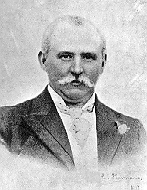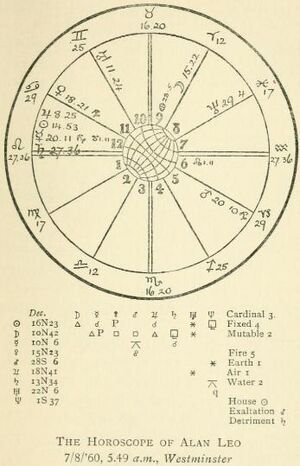Alan Leo facts for kids
Quick facts for kids
Alan Leo
|
|
|---|---|

Alan Leo
|
|
| Born |
William Frederick Allan
August 7, 1860 |
| Died | August 30, 1917 (aged 57) |
| Occupation | Astrologer |
Alan Leo, whose real name was William Frederick Allan, was a famous British astrologer. He was born in Westminster on August 7, 1860, and passed away in Bude on August 30, 1917. Besides being an astrologer, he was also a writer, publisher, and a theosophist.
He is often called "the father of modern astrology" because his work helped bring astrology back into popularity in the Western world. Before him, it had become less common after the late 1600s. Alan Leo was a strong believer in Theosophy, which is a spiritual philosophy. He included many of its ideas, like karma (the idea that your actions affect your future) and reincarnation (being reborn into a new life), into his astrological teachings. He used the large international network of the Theosophical Society to share his books and ideas across Europe and America.
How Alan Leo Changed Astrology

Alan Leo chose his pen name, Leo, from his own sun-sign. He is known for changing how people looked at horoscopes. Before him, astrologers often tried to predict exact events. But Alan Leo started a new way of thinking. He believed astrology should focus more on understanding a person's personality and general life trends, rather than predicting specific events.
His ideas were a big turning point. An astrology historian named James Holden explained that after Alan Leo, astrology moved away from predicting exact events. Instead, it focused more on understanding a person's character and giving general ideas about their psychological strengths or challenges.
In 1890, Alan Leo invited George R.S. Mead to start a special group in Brixton, South London, focused on hidden knowledge. Later in his life, in 1909 and again in 1911, Alan Leo and his wife traveled to India. There, he studied Indian astrology. Because of what he learned in India, he tried to add some parts of Indian astrology into the Western style of astrology.
Alan Leo's book The Art of Synthesis (published in 1912) likely influenced Gustav Holst's famous music piece, The Planets. In his book, Leo gave planets descriptions like calling Mars "the Energiser." In 1915, Alan Leo also founded the Astrological Lodge of London, a place for people interested in astrology to learn and meet.
Alan Leo's Books
- The Astrologer's Magazine, edited by Alan Leo, Vol. IV (1894) Vol. V series 1895–.
- How to Judge a Nativity. 2 vols. 1904. Reprint, London: Modern Astrology Office, 1928.
- Astrology for All series 1903–.
- The Progressed Horoscope. London: Fowler 1906.
- Horary Astrology. London: Modern Astrology Office, 1909.
- The Key to your own Nativity. London: Modern Astrology Office, 1910.
- The Art of Synthesis. Originally published 1912 as "How to Judge a Nativity" in the Astrology for All series. London: Fowler 1968.
- Casting the Horoscope. London: Modern Astrology Office, 1912.
- Esoteric Astrology, first published 1913. Destiny Books, Rochester, Vermont, 1989. ISBN: 0-89281-181-1
- Alan Leo's Dictionary of Astrology, edited and completed by Vivian E. Robson. London 1929.
- [1]Publisher: L.N. Fowler & Co; 2nd edition (1917),ISBN: 978-0553234145
See also
 In Spanish: Alan Leo para niños
In Spanish: Alan Leo para niños
 | Aaron Henry |
 | T. R. M. Howard |
 | Jesse Jackson |

